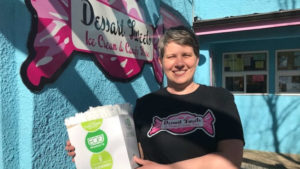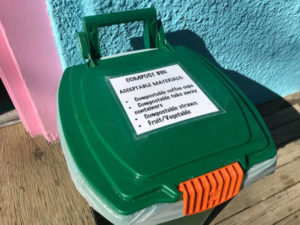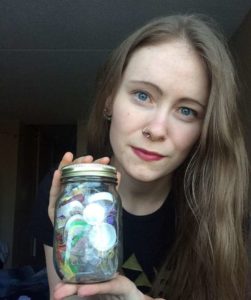Dessart Sweets, Leopold’s and Lancaster ditch plastic

Some Regina businesses are taking steps to make the planet a little bit greener.
In April, Dessart Sweets on 13th Avenue turned 16 and owner Shelley Patterson decided to celebrate by ditching plastic straws. Patterson said the the ice cream and candy shop used to give out about 5,000 plastic straws a year in milkshakes and sodas.
The store now offers compostable straws to replace their plastic counterparts and sells metal straws for those who want to invest in a more permanent replacement.

Patterson also installed a compost bin outside.
“I wanted to provide that to customers so that they know that it is going to end up in a compost facility,” Patterson said. “If it doesn’t get disposed of properly, it just ends up in a landfill anyways so it’s really not a win for the environment.
“So it was important to me to maybe educate people a little bit.”
According to Patterson, nixing straws added to an ongoing effort that started years ago with handing out paper bags instead of plastic. She also replaced the Keurig at the shop with pour-over coffee from Caliber and composts the grounds.
Dessart isn’t alone. The Lancaster Taphouse no longer automatically serves drinks with straws. Only customers who ask receive them.
Leo’s group, which runs Victoria’s Tavern and Leopold’s, also replaced plastic straws with eco-friendly ones. All the takeout containers and cups at Vegaboo Cat Haven are compostable and the store offers a discount to those who bring travel mugs when they’re grabbing a coffee.13th Avenue Coffee House also serves coffee in compostable cups. Bulk Barn now lets customers bring in their own jars, which they weigh before and after they’re filled-up.
Teresa Klotz, general manager of Dad’s Organic, said customers get loyalty points for bringing in their own bags, or a cooler to fill up with groceries.
“We’re trying to get them to be more aware,” said Klotz. “Even if they don’t take a bag we’ll give them extra points. Any way not to use any plastic bags.”
Body Fuel Organics, another local grocery store, now has an indoor hydroponic garden, compost initiatives and sells ugly produce without packaging.
An eco-friendly lifestyle
Emma Kramer-Rodger says environmentalists like her appreciate such incentives.
The Regina local said being environmentally friendly weighs into all her decisions, whether it be transportation or purchases of food or clothing.
“The main thing is to limit what you buy in the first place. Because the more you consume, the more of a carbon footprint that leaves,” she said.
Kramer-Rodger said she bikes as much as possible, or buses to work. She eats a plant-based diet, bought at local stores or the farmers market and avoids fast food — which often comes with a lot of waste. She buys her clothes used and makes her own environmentally friendly cleaners.

In total, she only produces a 16-ounce mason jar full of trash per month—that’s less than half a kilogram. The average Saskatchewan resident produces about 73 kg per month, according to The Conference Board of Canada.
Kramer-Rodger said she encourages people to take any steps they can to reduce that number.
“A lot of people seem to have this image that if they can’t be perfect, there’s no sense doing anything at all, which I think is very harmful. I think people should be happy with every single step they make,” she said.
“Always continue to consider where your things are coming from, how much you’re consuming, what type of planet you’re essentially leaving behind.”


